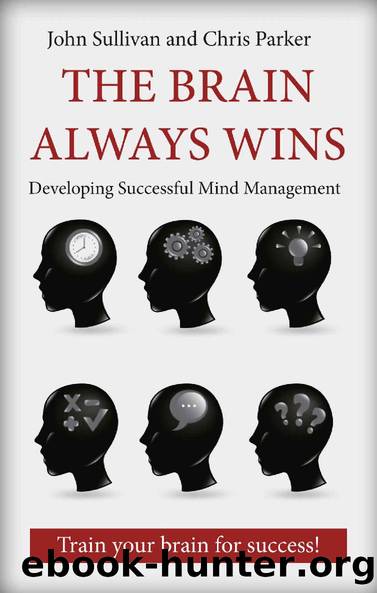The Brain Always Wins: Improving your life through better brain management by John Sullivan & Chris Parker

Author:John Sullivan & Chris Parker [Sullivan, John & Parker, Chris]
Language: eng
Format: epub
Publisher: Urbane Publications Limited
Published: 2016-10-04T00:00:00+00:00
The frontal lobe is area number 1. The temporal lobe is number 2, the parietal lobe is 3 and the occipital lobe is 4.
The frontal lobe is the largest of the four major lobes of the cerebral cortex, making up nearly 1/3rd of your entire brain. It is positioned in front of the parietal lobe and above and in front of the temporal lobe.
What the diagram doesnât show is that the frontal lobe contains most of the dopamine-sensitive neurons. Dopamine is the neurotransmitter that is considered to be both excitatory and inhibitory. Although most commonly referred to in relation to feelings of reward and pleasure, dopamine is also associated with attention and short-term memory. It enables focus and is responsible for our drive to get things done.
You might think, because of the significant role the frontal lobe plays in our everyday performance, that it develops quickly; enabling us to manage our emotions, movements, communications, decision-making and thinking to our own advantage. Youâd be wrong, though. The frontal lobe develops slowly. In boys the number of neurons in the frontal lobe increase until an average age of just over 12. In girls the age is just over 10. It doesnât stop there, however. The frontal lobe isnât fully formed and operational until a person is in their mid-late 20âs.
Perhaps you guessed that? Perhaps if you are, or have been, a parent of teenagers youâd already worked that out? Research into frontal lobe development does much to explain why teenagers might make irrational decisions, have trouble controlling their emotions and/or communicating appropriately. The brainâs relay station and the pathways to and from it are not complete during what can often be difficult teenage years and, consequently, the ability to manage some key aspects of cognitive functioning can be limited. So, if you ever experience a teenager demonstrating challenging, counter-productive or even potentially self-damaging behavior, you might:
Download
This site does not store any files on its server. We only index and link to content provided by other sites. Please contact the content providers to delete copyright contents if any and email us, we'll remove relevant links or contents immediately.
Inner Engineering: A Yogi's Guide to Joy by Sadhguru(6785)
The Power of Now: A Guide to Spiritual Enlightenment by Eckhart Tolle(5749)
Fear by Osho(4727)
Ikigai by Héctor García & Francesc Miralles(4246)
The Art of Happiness by The Dalai Lama(4125)
The Ultimate Bodybuilding Cookbook by Kendall Lou Schmidt(3935)
Yoga Therapy by Mark Stephens(3742)
The Little Book of Hygge by Meik Wiking(3682)
The Healing Self by Deepak Chopra(3568)
Why Buddhism is True by Robert Wright(3446)
The Hatha Yoga Pradipika (Translated) by Svatmarama(3326)
Being Aware of Being Aware by Rupert Spira(3272)
Shift into Freedom by Loch Kelly(3193)
Wild Words from Wild Women by Stephens Autumn(3149)
Work Clean by Dan Charnas(3116)
Happiness by Matthieu Ricard(3040)
More Language of Letting Go: 366 New Daily Meditations by Melody Beattie(3019)
Yoga Body & Mind Handbook by Jasmine Tarkeshi(2874)
Why I Am Not a Feminist by Jessa Crispin(2748)
